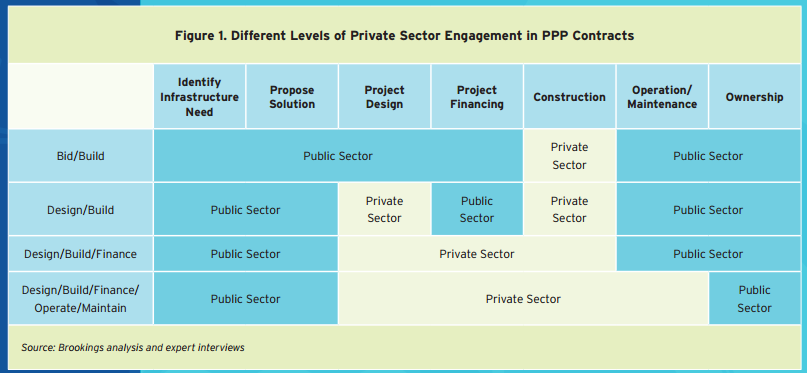BROOKINGS METROPOLITAN POLICY PROGRAM
Executive Summary
Despite its fundamental and multifaceted role in maintaining national growth and economic health, infrastructure in the United States has not received an adequate level of investment for years. Political dysfunction, a challenging fiscal environment, greater project complexity, and the sheer size of the need across different sectors are forcing leaders across the country to explore new ways to finance the investments and operations that will grow their economies over the next decade.
Part of this exploration means new kinds of agreements between governments at all levels and the private sector to deliver, finance, and maintain a range of projects. Beyond simplistic notions of privatization, the interest is in true partnerships between agencies, private firms, financiers, and the general public. Many nations already successfully develop infrastructure in this manner today.
These public-private partnerships (PPPs) are alternately framed as a panacea to all of America’s infrastructure challenges or a corporate takeover of critical public assets. In reality, they are neither. A well-executed PPP is simply another tool for procuring or managing public infrastructure—albeit a new and increasingly popular one.
The growing interest can be attributed to a number of factors, including tightening budgets, increased project complexity, better value for money, the desire to leverage private sector expertise, and shifting public sector priorities.
However, this surge of interest is not matched by broad public sector understanding of the PPP landscape.
This paper is designed to fill that gap by providing an overview of basic PPP structure, how to consider proper risk and reward sharing, and the purpose and the rationale behind these arrangements. It is based on extensive background research and directly informed by interviews with leading practitioners from the public and private sector. Primarily, this paper presents nine recommendations for public leaders as they consider PPPs and is intended to serve as a guide to executing them in the
public interest.
- Create a strong legal framework at the state level. PPPs require a sound legal basis to ensure that the public sector has the authority to pursue a deal and allows the private sector to mitigate unnecessary political risk.
- Prioritize projects based on quantifiable public goals. Not every infrastructure project is suitable for a PPP, so it is essential for policymakers to base their procurement decisions on economic and financial analysis that captures the social, environmental, and fiscal impacts of the deal.
- Pick politically smart projects. A successful PPP requires a pragmatic understanding of what is feasible in a constantly evolving political environment.
- Understand what the private sector needs. Strong partnerships are based on finding the right alignment of interests, which is why it is essential to understand what makes a project appealing to private sector investors.
- Find the right revenue stream. PPPs are not free money; they require localities to find durable and resilient revenue sources that will pay for the investment over the long-term.
- Create a clear and transparent process. Routinization and standardization will create a market for PPPs that provides the public and private sector with a clear roadmap for success.
- Build an empowered team. Assembling an empowered public sector team that is capable of making and executing informed procurement decisions is an essential part of any successful PPP.
- Actively engage with stakeholders. PPPs are inherently complex deals that require significant public engagement to ensure that the deal is in the interest of the community and executed at the highest standards possible.
- Monitor and learn from the partnership. PPPs involve decades of dedicated attention that requires thoughtful monitoring, flexibility in the face of a changing world, and a willingness to learn from mistakes.
Download full version (PDF): Private Capital, Public Good
About the Brookings Metropolitan Policy Program
www.brookings.edu/about/programs/metro
The Metropolitan Policy Program at Brookings is redefining the challenges facing metropolitan America and identifying assets and promoting innovative solutions to help communities grow in more productive, inclusive, and sustainable ways.
Tags: Brookings Institution, Brookings Metropolitan Policy Program, PPPs, Public-Private Parnerships







 RSS Feed
RSS Feed